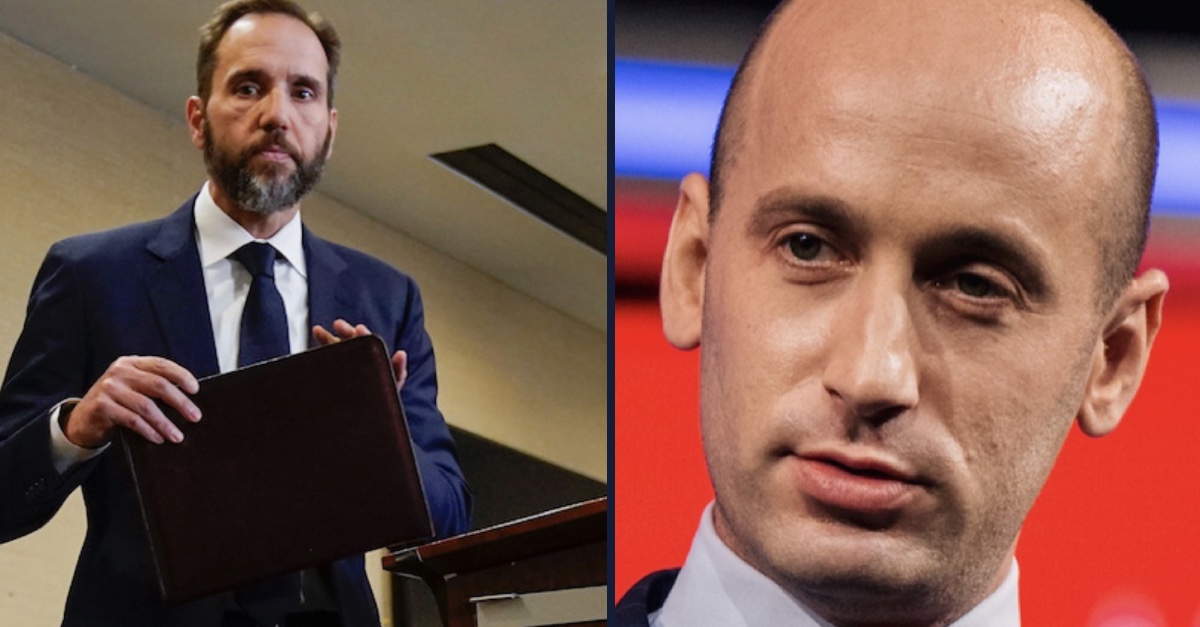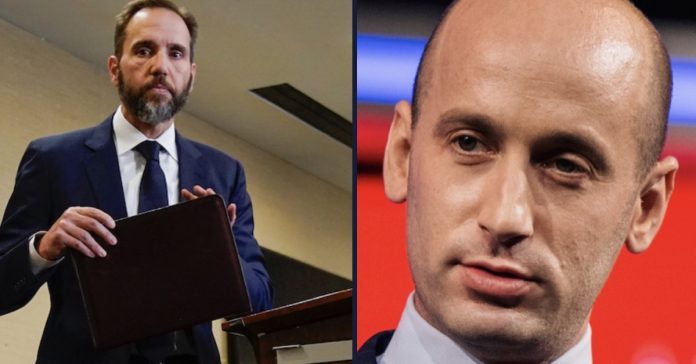
Jack Smith (AP Photo/Jacquelyn Martin), Stephen Miller (Photo by Brandon Bell/Getty Images)
Ahead of Thursday morning’s much anticipated motion hearing on former President Donald Trump’s bids to dismiss his Espionage Act indictment on grounds of unconstitutional vagueness and the Presidential Records Act (PRA), special counsel Jack Smith responded to America First Legal Foundation’s (AFL) “untenable theory” that the National Archives’ (NARA) criminal referral violated the law.
AFL, a legal group headed by former Trump White House senior advisor Stephen Miller, made an entrance into the case as amicus curiae — a friend of the court — with arguments supporting the Trump defense’s attempt to get the Mar-a-Lago willful retention of national defense information and obstruction case tossed under the PRA.
AFL claimed to have “uncovered” proof that NARA committed an “unlawful abuse of executive authority” through its criminal referral to the Department of Justice, a violation of the Administrative Procedure Act that the group submitted should be enough to dismiss the indictment.
Smith previously attacked the claims of an improper criminal referral as “fundamentally wrong” because even even if Trump had a valid PRA argument, that didn’t give him “license” to obstruct a grand jury probe nor grant him a “free pass” for the same “based on his legal claim that those entities lacked authority to investigate.”
More Law&Crime coverage: Trump pleads for Mar-a-Lago judge to dismiss charges on eve of hearing
The special counsel went a step further in his latest opposition filing, providing an absurd example of what this theory, if it were to be accepted, would mean were an armed individual to show up at a NARA facility (some citations removed for ease of reading):
America First Amicus cites no authority for the proposition that an agency cannot make a criminal referral unless a statute or regulation explicitly authorizes it to do so. And such a rule would be unworkable in practice. Under amicus’s theory, for example, if a person illegally carries a firearm into a NARA facility […] or uses illegal drugs there, […], or forcibly threatens a NARA employee, […], NARA is powerless to report that criminal conduct to the FBI, and instead must first engage in notice-and-comment rulemaking to promulgate a regulation authorizing it to make such a referral. Indeed, under amicus’s theory, although federal regulations require agencies to report “any unauthorized removal, defacing, alteration or destruction” of federal records to NARA, see id. § 1230.10, NARA is prohibited from referring such information to the Department of Justice—even when it shows a clear violation of federal criminal law, e.g., 18 U.S.C. § 2071—because any such referral would violate the Administrative Procedure Act. The Court should reject this unsupported and untenable theory.
The Special Counsel’s Office would add that the “claim that NARA lacked authorization to make a criminal referral is wrong” and that AFL’s arguments in general “are without merit.” After AFL’s arguments initially hit the docket, one attorney commented that the act of trying to respond to the group’s claims would be “akin to arguing with someone in 2024 that the world is not flat.”
The prosecution and the defense were already warned to clear their calendars in the event that a “full day” of argument was needed Thursday, and the hearing in U.S. District Judge Aileen Cannon’s courtroom has begun.
Have a tip we should know? [email protected]

